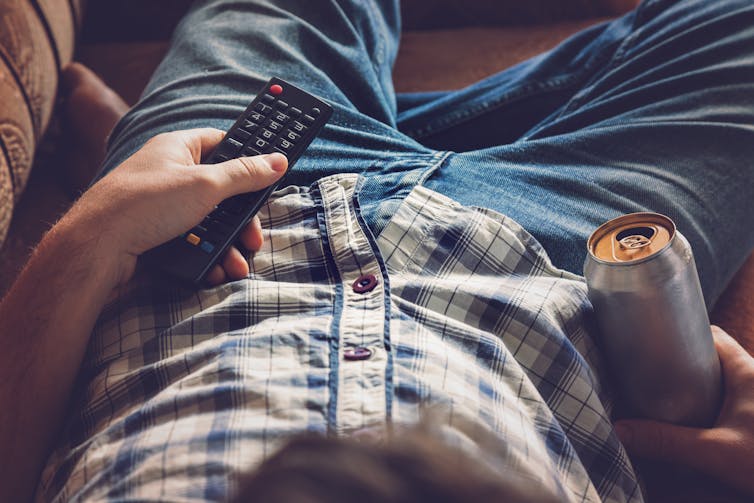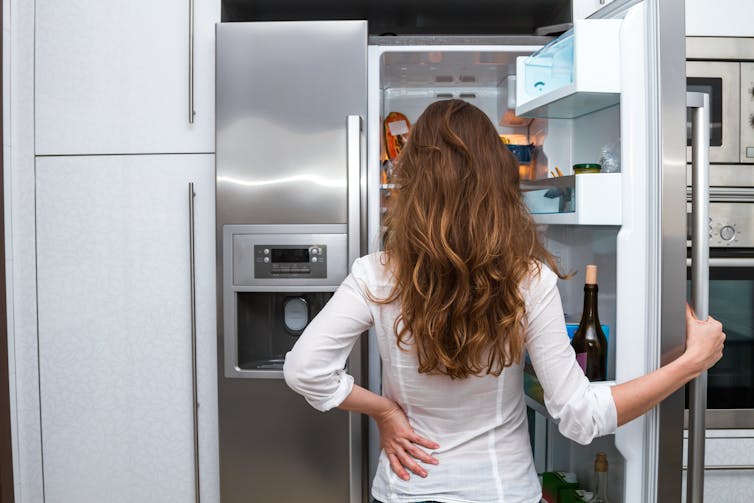Worried about your drinking during lockdown? These 8 signs might indicate a problem
- Written by Nicole Lee, Professor at the National Drug Research Institute (Melbourne), Curtin University
We’ve seen images of people “panic buying” alcohol since lockdown started in March. Now new data from the advocacy group Foundation for Alcohol Research and Education (FARE) shows people are not just stocking up for a rainy day. In households that have been buying extra alcohol, 70% are drinking more than usual too.
People tend to drink more during major disasters and crises. So it’s not surprising we’re seeing an increase in alcohol consumption during the coronavirus pandemic.
Most people drink for social reasons. It’s enjoyable, relaxing and a central part of Australian culture. But the FARE research found around one-third of those who purchased more alcohol were concerned about their own or someone else’s drinking.
So when do you need to worry that your drinking is becoming a problem?
How much is it OK to drink?
Most people drink within the Australian alcohol guidelines, which aim to reduce risk of health problems related to alcohol.
The new draft guidelines, released earlier this year, say healthy adults should drink no more than ten drinks a week and no more than four in any one day.
Read more: Cap your alcohol at 10 drinks a week: new draft guidelines
If you have existing health problems alcohol affects you more, and if you are under 18 or pregnant, you shouldn’t drink at all.
If you stay within these guidelines, you significantly lower your risk of a range of health problems including at least seven cancers (liver, oral cavity, pharyngeal, laryngeal, oesophageal, colorectal, liver and breast cancer), diabetes, liver disease, brain impairment, mental health problems and obesity.
Staying within these guidelines is one way to reduce the risk of drinking becoming a problem.
Here’s what happens after you take your first sip of alcohol.Signs your drinking may be problem
1. Not keeping up responsibilities
You’d be forgiven for not getting out of your pyjamas or putting on makeup everyday during lockdown. But if you find you’re not keeping up with major responsibilities at home, work, or school, it might be a sign your drinking is becoming a problem.
You might wake up with a hangover, for example, and can’t do your work or make the kids’ breakfast.
When alcohol starts to interrupt your daily living and functioning, it’s a sign you’re probably drinking too much.
2. Concern from others
If people close to you are starting to comment on how much you’re drinking or express concern you’re drinking too much, that can be one of the early signs you’re on a slippery slope.
Or if your relationships are becoming strained because of your drinking (for example, you’re getting into arguments with your partner more frequently), it might be time to look at how much you’re drinking.
 Have family members commented on how much you’re drinking?
Shutterstock
Have family members commented on how much you’re drinking?
Shutterstock
3. Drinking to cope
In the FARE survey, one in four people said they were drinking to cope with stress.
Meanwhile, more than half the people who took part in a survey for Hello Sunday Morning, an online support site for people wanting to change their drinking, said they were drinking more from boredom or loneliness.
People who drink in response to stress tend to drink larger amounts of alcohol. If this is you, think about healthier activities to relax and manage how you’re feeling.
4. Poorer mental health
Alcohol impacts on mental health and well-being. Although initially it creates a feeling of relaxation, it can increase anxiety and disrupt sleep.
If you have increased your drinking and your sleep is also disrupted it might be related. Alcohol affects quality of sleep that in turn lowers your ability to cope with stress.
5. Aggression and violence
If you find you’re becoming angry, aggressive or violent when you are drinking, it’s a problem. It may be best to stop drinking altogether.
Alcohol reduces inhibitions and also affects our ability to regulate our emotions. You may need to deal with underlying mental health issues.
6. Regular heavy drinking
Drinking alone is more common among people who are dependent on alcohol, but if you have a drink now and then on your own, it’s not in itself a sign you have a drinking problem.
 How frequently do you drink alone?
Shutterstock
How frequently do you drink alone?
Shutterstock
But if you’re frequently drinking alone or frequently getting drunk when you are alone, the quantity and frequency may signal a problem. Daily drinking (alone or with others) is associated with dependence and other problems.
7. Building tolerance
If you’re finding the usual amount of alcohol doesn’t seem to have the same effect or you need to drink more to get the same effect, that’s a sign you have increased your tolerance to alcohol. It’s an early sign of dependence.
8. Unintended consequences
If you experience unintended consequences, it may indicate you’re not in full control of your drinking.
This might mean drinking more than you intended, getting drunk when you didn’t intend to, drinking so much you forget what happened (blacking out) or frequently waking up with a hangover.
Where to get help
If you want to check your consumption, try the AUDIT screening tool online.
If you’re trying to manage your drinking, Hello Sunday Morning offers a free online community of more than 100,000 like-minded people. You can connect and chat with others actively changing their alcohol consumption.
If you’d like to talk to someone about your drinking, call the National Alcohol and Other Drug Hotline on 1800 250 015. It’s a free call from anywhere in Australia.
You can also chat online with a counsellor at CounsellingOnline. Or talk to your GP about seeing a psychologist or counsellor.
Read more: What can you use a telehealth consult for and when should you physically visit your GP?
Authors: Nicole Lee, Professor at the National Drug Research Institute (Melbourne), Curtin University





